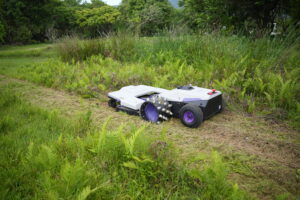
When it comes to professional landscaping, the right commercial lawn mower can make all the difference. From large-scale municipal contracts to daily lawn care operations, choosing the right brand impacts performance, cost-efficiency, and even client satisfaction. In this post, we’ll cover the most trusted names in the industry, their standout features—backed by market data and user reviews—and why a new electric contender might be worth your attention.
Commercial Mower Market Trends in 2025
- The U.S. electric lawn mower market reached USD 2.34 billion in 2023 and is projected to hit USD 3.49 billion by 2030, growing at a CAGR of 5.8% (Grand View Research).
- The commercial segment of the global lawn mower market is expected to grow from USD 6.97 billion in 2023 to USD 7.48 billion in 2024, and further accelerate to USD 11.64 billion by 2030, with a CAGR of 7.53% (GlobeNewswire).
- Zero-turn electric commercial mowers are among the fastest-growing categories, with North America leading demand.
These trends confirm a growing demand for electric, high-performance, and intelligent mowing solutions in the professional segment.
1. Scag Power Equipment
Known for: Zero-turn mowers, durability, and speed.
Scag has long been a staple in the professional landscaping industry. Their zero-turn mowers are highly regarded for commercial-grade cutting decks, powerful engines, and long-term reliability. Landscapers favor Scag for its ease of maintenance and service network.
Market Insight: Scag is frequently mentioned in professional forums like Reddit. One landscaper wrote, “Scag is superior to them all. The belts last longer than anyone else’s” (Reddit).
Ideal for: Professional landscapers and lawn maintenance businesses.
Watch out for: High maintenance costs for older gas-powered models.
2. John Deere
Known for: Broad product line, dealer network, and brand trust.
John Deere offers a wide range of commercial mowers, including stand-on and ride-on models. Their mowers come with strong build quality, comprehensive warranties, and the reassurance of a century-old brand.
Market Insight: According to IMARC Group, John Deere remains one of the top commercial mower brands in North America’s electric mower segment (IMARC Group).
Ideal for: Municipal use, farms, and contractors with long-term investment in mind.
Watch out for: Higher upfront cost.
3. Toro
Known for: Innovative features and high performance in turf management.
Toro’s commercial zero-turn mowers are engineered for heavy-duty use. The company is also a leader in grounds maintenance for sports fields and golf courses, with models optimized for quality and operator comfort.
Market Insight: Toro is cited as a key vendor in the zero-turn electric mower segment, with strong B2B growth projections (GMI Insights).
Ideal for: Sports turf maintenance and large-area commercial mowing.
Watch out for: Complex electronic systems may require dealer service.
4. Exmark
Known for: Commercial zero-turns and productivity.
A subsidiary of Toro, Exmark is specifically geared toward the commercial market. With features like RED technology and UltraCut decks, Exmark mowers are built for speed and consistency.
Market Insight: Frequently used by daily lawn care crews for reliability and time efficiency.
Ideal for: Professional crews that mow daily under high demand.
Watch out for: Limited versatility beyond mowing.
5. Hustler Turf Equipment
Known for: Smooth operation and price-to-performance ratio.
Hustler’s zero-turn models are often cited as easier to maneuver, with industry-first hydro gear systems and ergonomic designs. They offer good value without compromising much on build quality.
Market Insight: Seen as a cost-effective alternative by midsize landscaping businesses.
Ideal for: Medium-scale commercial users and fleet operations.
Watch out for: Limited dealer service in some areas.
6. Gravely
Known for: Long-lasting build and cost-efficiency.
Gravely’s professional mowers have thick-gauge steel decks and powerful Kawasaki or Kohler engines. The company focuses on practical durability over high-tech features.
Market Insight: Reddit users appreciate Gravely for being “bulletproof and reliable” for long-term ROI (Reddit).
Ideal for: Landscapers who prioritize long-term ROI over bells and whistles.
Watch out for: Fewer technology integrations compared to others.
7. Wright
Known for: Stand-on mower innovation and compactness.
Wright invented the stand-on mower category and continues to lead with compact, nimble machines perfect for urban and suburban landscaping. They excel in areas with tight access or where trailer space is a premium.
Ideal for: Urban contractors and landscaping businesses with limited space.
Watch out for: Less comfortable for extended use compared to ride-ons.
The Rise of a New Challenger: Electric, Remote-Controlled Mowing
As sustainability and labor efficiency become top priorities, commercial users are increasingly turning to electric and autonomous solutions. California has already mandated the phase-out of small gas-powered engines, including lawn equipment, by 2024 (CARB).
Enter the Pandag G1, a fully electric, remote-controlled commercial mower designed for the challenges that traditional brands struggle to address:
- Pure Electric: Zero emissions, ultra-quiet operation, and lower maintenance.
- All-Terrain Capability: Handles up to 38° slopes, mud, and uneven fields.
- Remote-Controlled: Increases operator safety and convenience.
- Modular Design: Switch between mowing deck, snow plow, and more.
With an IPX65 waterproof rating, 86V/52Ah battery system, and rugged commercial chassis, the Pandag G1 offers a modern alternative for landscaping pros, rental services, and farm owners seeking more flexible, future-ready tools.
Market Opportunity: According to GlobeNewswire, the commercial autonomous mower segment is expected to grow significantly in North America, driven by labor shortages and cost-saving automation (GlobeNewswire).
Ready to rethink your mowing strategy? Learn more about the Pandag G1 here →
Final Thoughts
Each of the commercial mower brands above has built its reputation on performance, service, and dependability. But with new challenges—labor shortages, environmental regulations, and terrain complexity—forward-looking professionals are exploring smarter alternatives.
Electric, autonomous, and modular machines like the Pandag G1 may not only match legacy brands—they might just redefine the industry standard.
